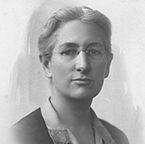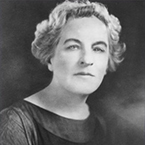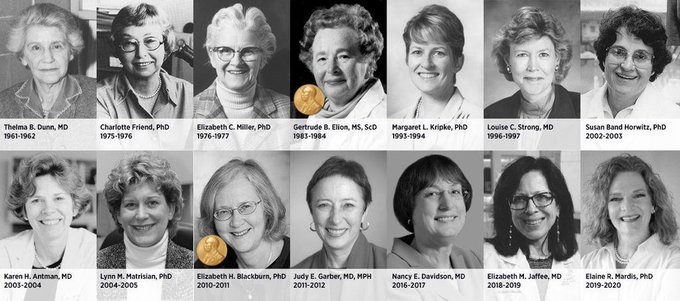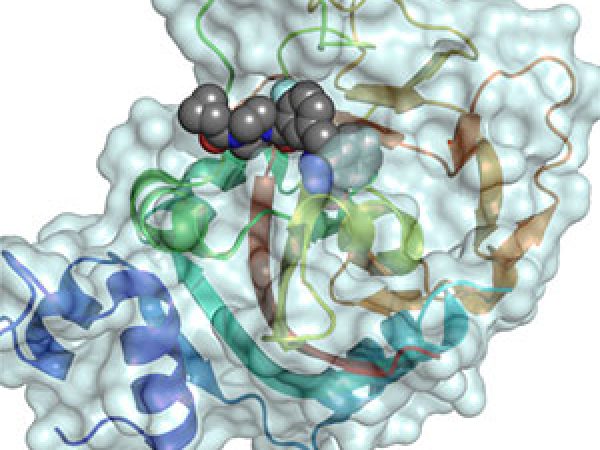Celebrating Women in Cancer Science
Women have played many pivotal roles at the American Association for Cancer Research (AACR), from the organization’s earliest years to the present day.

MD, DrPH
In 1908, just a year after the AACR was founded, Martha Tracy, MD, DrPH, of Women’s Medical College in Philadelphia, became the AACR’s first female member. Tracy worked closely with William B. Coley, MD, who was one of the AACR’s founding members and was known as the “Father of Immunotherapy.” Tracy assisted in the development of “Coley’s Toxins,” now widely accepted as one of the first effective immunotherapeutic agents. She served as Dean of the Women’s Medical College of Pennsylvania from 1917 to 1940, and became a renowned researcher and professor of preventive medicine.

Just a few years later, in 1913, Maud Slye, DSc, became the first woman to present research at an AACR Annual Meeting. Slye was a basic researcher who studied the inherited susceptibility of cancer and the effects of prolonged “irritation” of susceptible tissues. Only 34 years old when she presented at the Annual Meeting, Slye went on to become Director of the University of Chicago Cancer Laboratory in 1919, and a Professor Emeritus of Pathology in 1945.
A rich tradition of female leadership
While women joined the AACR in increasing numbers through the first half of the 20th century, it wasn’t until 1957 that a woman joined the AACR Board of Directors—Elizabeth C. Miller, PhD. In 1961, the members of the AACR elected Thelma B. Dunn, MD, President, marking the first time a woman would hold this distinguished post.
Although the change was not immediate, Dunn’s presidency laid a foundation for female leadership of the AACR. In all, 14 women have served as President of the AACR, including Charlotte Friend, PhD, 1975-1976; Elizabeth C. Miller, PhD, 1976-1977; Gertrude B. Elion, DSc, 1983-1984; Margaret L. Kripke, PhD, 1993-1994; Louise C. Strong, MD, 1996-1997; Susan Band Horwitz, PhD, 2002-2003; Karen H. Antman, MD, 2003-2004; Lynn M. Matrisian, PhD, 2004-2005; Elizabeth H. Blackburn, PhD, 2010-2011; Judy E. Garber, MD, MPH, 2011-2012; Nancy E. Davidson, MD, 2016-2017; Elizabeth M. Jaffee, MD, 2018-2019; and Elaine R. Mardis, PhD, 2019-2020. Many of these women have also been elected Fellows of the AACR Academy, serving as part of the AACR’s global brain trust and providing expertise in all areas of cancer science.

“The AACR has benefited enormously from these extraordinary women who have combined their expertise in cancer research with their leadership skills,” said Margaret Foti, PhD, MD (hc), chief executive officer of the AACR.

Foti herself is a pioneering female leader. After beginning her AACR career in an editorial position with the journal Cancer Research, Foti progressed through several key editorial and management roles in scientific publishing to become chief executive officer. She has guided the organization through exponential growth, with dramatic expansion in membership, the launch of multiple high-impact journals, and an increased focus in critical areas of advocacy, such as cancer health disparities and federal funding for biomedical research. Foti reminisced about her career in a 2018 blog post.
Women in Cancer Research
Founded in 1998, the AACR-Women in Cancer Research (WICR) membership group recognizes women’s scientific achievements and fosters their career development to create a more equitable cancer workforce.
Among many initiatives, WICR conducts educational sessions and provides networking opportunities at AACR meetings. WICR also facilitates scientific awards and grants and provides a framework for mentoring early-career investigators.
There’s a strong scientific motivation underpinning WICR’s mission: Research has shown that diverse health care teams often produce better patient outcomes.
“The AACR’s sponsorship of WICR is important … not just for those women, but ultimately, for the benefit of patients,” said AACR Past President Elaine Mardis in a video commemorating WICR’s 20th anniversary (see below).
Today, approximately 42 percent of the AACR’s 48,000 members are women, and half the members of our Board of Directors are women. With this strong representation, we know that women will continue to thrive at the AACR and in the broader cancer research community.
Who will make history next?

In 2020, Emmanuelle Charpentier, PhD, and Jennifer A. Doudna, PhD, received the Nobel Prize in Chemistry. Charpentier and Doudna, members of the 2017 class of Fellows of the AACR Academy, were honored for developing the CRISPR/Cas9 genome-editing system, which has contributed greatly to the understanding of tumor initiation and progression.

“From its earliest days, AACR leaders have recognized the importance of extraordinary contributions by women and have been dedicated to the goal of shining a spotlight on their accomplishments,” Foti said. “We look forward to the next wave of advances driven by brilliant female scientists.”
Charpentier and Doudna were not the first female AACR members to win—that honor went to AACR Past President Gertrude B. Elion in 1988 for her work in drug development. Other groundbreaking female scientists followed in her path and we know more will do so in the future.



